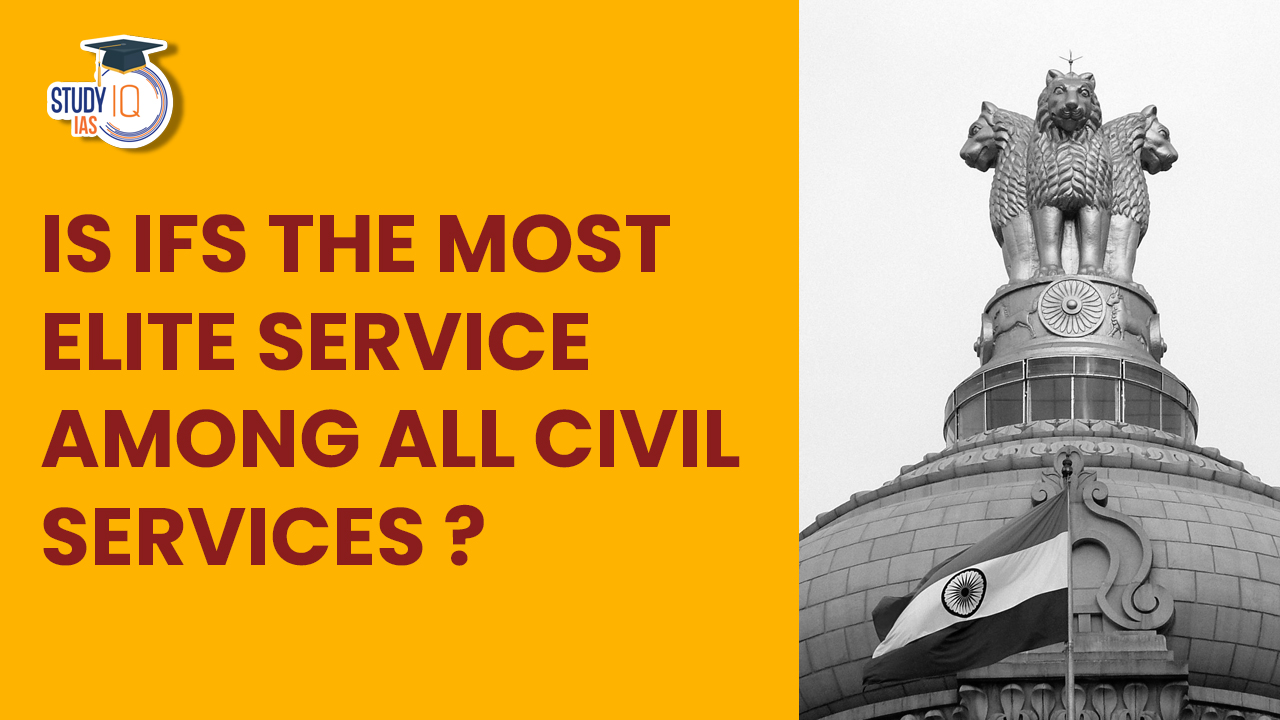Table of Contents
Introduction
Is IFS the most elite service among all Civil Services?: Within the realm of Civil Services in India, the Indian Foreign Service (IFS) stands out as a service renowned for its prestige and exclusivity. In this blog post, we will explore the factors that contribute to the elite status of the IFS and shed light on why it is widely considered one of the most esteemed services among all Civil Services. The Indian Foreign Service (IFS) is widely considered one of the most prestigious and elite services among all Civil Services in India.
Is IFS the most elite service among all Civil Services?
Here are several reasons why IFS holds recognition:
Global Diplomatic Representation
As a member of the IFS, officers represent India on an international platform. They serve in Indian embassies and consulates worldwide, engaging in diplomatic negotiations, representing the country’s interests, and fostering relationships with other nations. The international exposure and the responsibility of representing the nation at a global level contribute to the elite status of the IFS.
Rigorous Selection Process
The selection process for the IFS is highly competitive and demanding. Aspiring candidates undergo the same Civil Services Examination conducted by the Union Public Service Commission (UPSC). However, the allocation of services is based on candidates’ ranks, and securing a position in the IFS often requires a higher rank due to the limited number of vacancies available. The intense competition and stringent selection process add to the perceived prestige of the IFS.
Specialized Training and Expertise
Officers in the IFS undergo comprehensive training programs to develop diplomatic skills, international relations knowledge, and foreign language proficiency. The training equips them with the necessary tools to handle complex international issues and engage in diplomatic negotiations effectively. The specialized training further enhances the reputation of the IFS as an elite service.
Direct Involvement in Foreign Policy Formulation
IFS officers work closely with the Ministry of External Affairs and play a vital role in formulating India’s foreign policy. They provide valuable insights, expertise, and recommendations on international affairs to the government. The influence and direct involvement in shaping India’s foreign policy contribute to the elite status of the IFS.
Prestige and Recognition
The IFS enjoys significant recognition and prestige in Indian society. The role of diplomats and the perception of diplomacy as an intellectually demanding and socially esteemed profession contribute to the high regard for the IFS. The recognition and respect accorded to IFS officers both within the country and internationally further solidify their elite status.
IFS the most elite service Role and Responsibilities
IFS officers are responsible for representing India in its Embassies, High Commissions, Consulates, and Permanent Missions to Multilateral Organizations like the United Nations. They must defend India’s interests in the nation where they are deputed.
Must establish friendly relationships with all the key players in the nation where they are posted. It is necessary to report any changes that occur in the deputation nation that may have an impact on Indian policy. Provide Indian and foreign nationals with access to consular services after successfully negotiating on a number of important issues with the relevant authorities in the posting country.
India’s Ministry of External Affairs (MEA) is solely in charge of all issues pertaining to its international relations. Two divisions exist. The territorial division is one of them; it deals with the economic, political, and bilateral issues with the relevant nations. The functional division is the other part, and it deals with a wide range of concerns, including those related to multilateral organizations, disarmament, different regional groupings, legal, press, publicity, policy matters, and a variety of other issues.
Life and Job of an IFS Officer
There is a lot of work being done in the background of the sparkle and glamour. They must constantly monitor and note every aspect that might have an impact on India’s interests in foreign policy. They must also uphold the nation’s reputation overseas and use extreme caution in both their personal and professional lives. A diplomat is constantly being scrutinized.
Being that the officer represents India to the globe, behaviour and words must be measured. A single mistake might ruin a diplomatic career for an IFS officer. Additionally, the official’s spouse and kids are also required to contribute, so it’s not just them who are under constant observation.
There are Indian missions, embassies, and consulates all over the world, in developed and developing—even war-torn—countries. Even adversarial nations maintain certain diplomatic ties. The life and safety of an IFS officer may frequently be in danger as a result of abrupt social changes like revolutions or military coups. They must always be on guard in politically risky nations, and occasionally the entire mission may need to be evacuated quickly. Coordination of lobbying and information collection efforts in the area where an IFS officer is assigned is one of their many responsibilities. Even in friendly nations, this is extremely perilous for the officers and their employees.
IFS the most elite service among all Civil Services?
While the perception of prestige may vary among individuals and across different Civil Services, the Indian Foreign Service (IFS) undeniably holds an elite status. The combination of global diplomatic representation, a rigorous selection process, specialized training, influence in foreign policy formulation, and societal recognition collectively contribute to the esteemed reputation of the IFS. However, it is important to acknowledge that each Civil Service plays a vital role in nation-building, and the choice of service should align with individual interests, skills, and aspirations.


 Daily Quiz 25 April 2025
Daily Quiz 25 April 2025
 UPSC Marks 2025 Out – Download UPSC Ma...
UPSC Marks 2025 Out – Download UPSC Ma...
 Best Optional Subject for UPSC, Check Sc...
Best Optional Subject for UPSC, Check Sc...





















